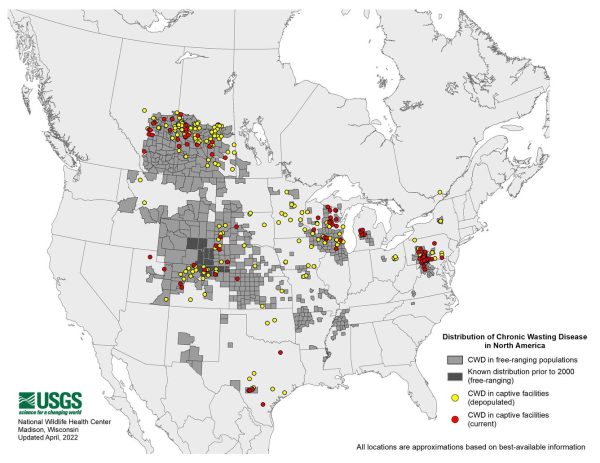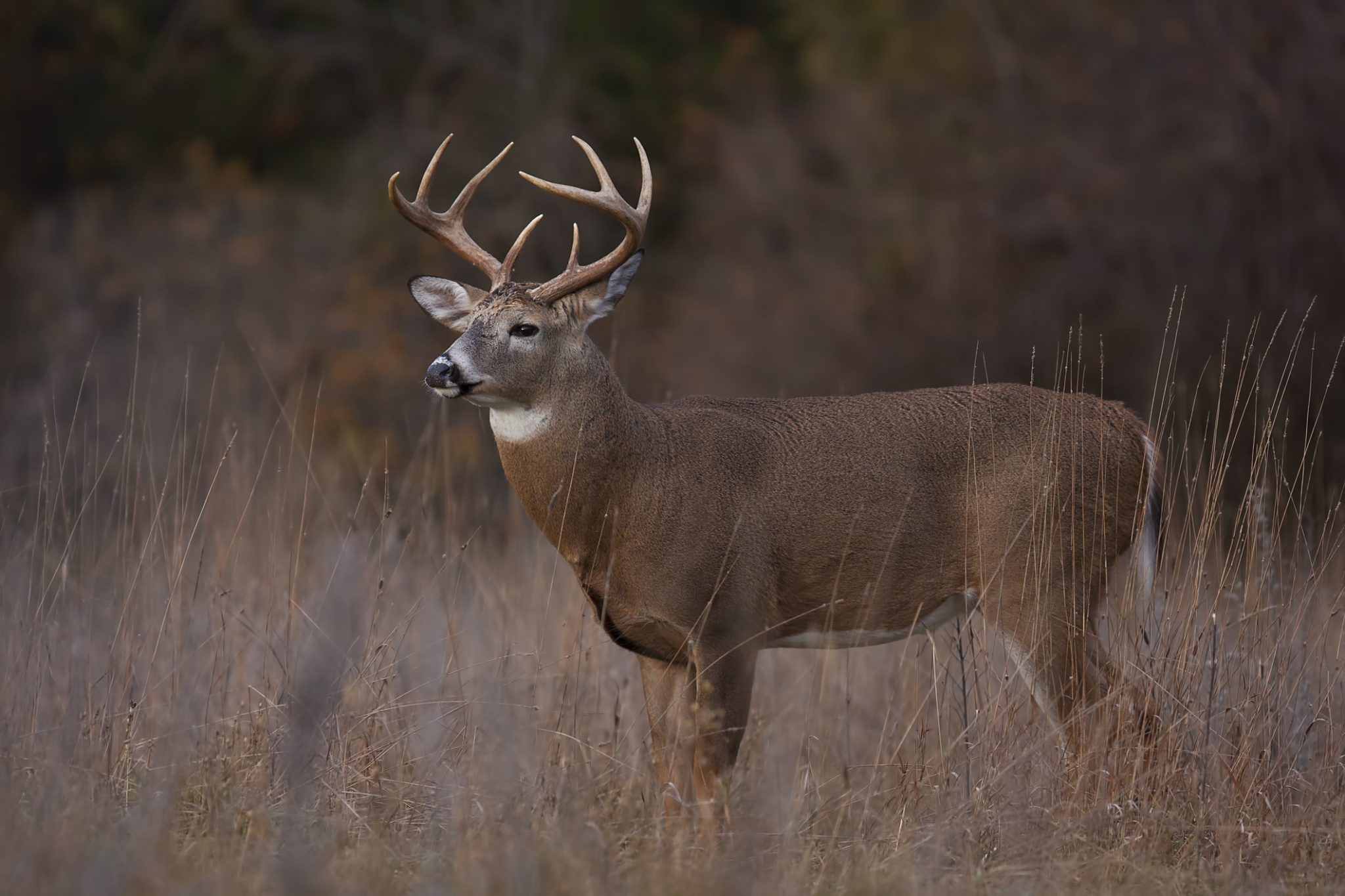Forestry & Wildlife

Chronic wasting disease (CWD) is a fatal neurodegenerative disease affecting cervids such as deer. Knowing the causes and symptoms to look for and applying recommended prevention methods helps control the spread of the disease and protect deer populations.
CWD is a transmissible spongiform encephalopathy (TSE) similar to scrapie in sheep and goats, bovine spongiform encephalopathy (mad cow disease) in cattle, and Creutzfeldt-Jakob disease (CJD) in humans. Among the cervids affected are white-tailed deer, mule deer, elk, moose, and caribou.

Figure 1. Known CWD cases in North America as of April 2022 (United States Geological Survey, National Wildlife Health Center)
The disease was first discovered in mule deer in 1967 at a research facility in Colorado. CWD is now found in captive and free-ranging cervid herds in many states and Canadian provinces (figure 1). CWD was detected in two hunter-harvested adult bucks killed in Lauderdale County, Alabama, during the 2021–22 hunting season.
Cause and Transmission
CWD is caused by a misfolded prion, an abnormal form of a normal protein found in the central nervous system. The prion infects the host animal and causes normal proteins to become abnormal, causing brain cell degeneration.
CWD prions are transmitted from animal to animal through contact with bodily fluids (e.g., saliva, blood, urine, feces) or tissue (e.g., carcasses, gut piles) of an infected animal. Unlike bacteria and viruses, CWD prions may remain infectious in the open environment for many years; therefore, transmission from the environment is also possible.
CWD spreads across the landscape through the natural movement of deer. However, this spread has accelerated due to the transport of infected animals and body parts by humans. The practice is now illegal in Alabama and most other states.
While CWD has not been shown to be transmissible to humans, the Centers for Disease Control and Prevention recommends that humans not consume meat from CWD-positive deer.
Symptoms
CWD is detected primarily in adult deer, but all ages are susceptible. Common symptoms include weight loss over time, emaciation, lack of wariness, difficulty moving or standing, lowering of the head, tremors, listlessness, and excessive salivation and urination. Deer that appear perfectly healthy, however, can still be infected as it takes time for symptoms to develop.
Diagnosis and Treatment
The only way to determine if a deer has CWD is through laboratory testing of tissue samples collected from a portion of the brain stem or lymph nodes found by the deer’s throat. There is currently no USDA-approved live animal test for CWD.
Chronic wasting is a progressive disease and invariably fatal. There is no treatment, vaccine, or cure.
Prevention
Know the law and follow it. As more testing is conducted throughout Alabama in the coming years, the prevalence and occurrence of CWD will change. It is important to frequently check with the Alabama Department of Conservation and Natural Resources website at www.outdooralabama.com for updates regarding CWD management zone (CMZ) designations and other CWD-related information.
Know the laws regarding the importation of deer carcasses and body parts. To help prevent the spread of CWD, the Alabama Division of Wildlife and Freshwater Fisheries has established laws prohibiting the importation of whole carcasses and certain body parts of any deer (all cervids) from outside Alabama or from designated CWD management zones (CMZ) within Alabama.
Importation of the following is allowed:
- Completely deboned deer meat
- Cleaned skull plates with attached antlers if no visible brain or spinal cord tissue is present
- Raw capes if no visible brain or spinal cord tissue is present
- Upper canine teeth, if no root structure or other soft tissue is present
- Finished taxidermy products or tanned hides
Monitor and report encounters. The Alabama Division of Wildlife and Freshwater Fisheries has voluntary check stations where hunters can bring deer for CWD testing. The information can be used to guide meat consumption.
Report a deer that appears to be sick or diseased to the Wildlife and Freshwater Fisheries office nearest you. Report any transport of live deer, elk, or other cervids on Alabama’s roads and highways to Operation Game Watch at (1-800) 272-4263. Find additional information on CWD at the Outdoor Alabama website at www.outdooralabama.com.
 Mark W. Smith, Professor, Forestry, Wildlife, and Environment, Auburn University
Mark W. Smith, Professor, Forestry, Wildlife, and Environment, Auburn University
Revised July 2022, Chronic Wasting Disease in Deer, ANR-2531

